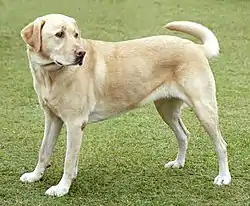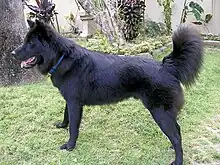собака
Old East Slavic
Etymology
Inherited from Proto-Slavic *sobàka.
Pronunciation
Declension
| Singular | Dual | Plural | |
|---|---|---|---|
| Nominative | собака sobaka |
собацѣ sobacě |
собакꙑ sobaky |
| Genitive | собакꙑ sobaky |
собаку sobaku |
собакъ sobakŭ |
| Dative | собацѣ sobacě |
собакама sobakama |
собакамъ sobakamŭ |
| Accusative | собакѫ sobakǫ |
собацѣ sobacě |
собакꙑ sobaky |
| Instrumental | собакоѭ sobakojǫ |
собакама sobakama |
собаками sobakami |
| Locative | собацѣ sobacě |
собаку sobaku |
собакахъ sobakaxŭ |
| Vocative | собако sobako |
собацѣ sobacě |
собакꙑ sobaky |
Descendants
References
- Sreznevsky, Izmail I. (1912) “собака”, in Матеріалы для Словаря древне-русскаго языка по письменнымъ памятникамъ [Materials for the Dictionary of the Old East Slavic Language Based on Written Monuments] (in Russian), volumes 3 (Р – Ꙗ и дополненія), Saint Petersburg: Department of Russian Language and Literature of the Imperial Academy of Sciences, column 455
Old Ruthenian

Alternative forms
- саба́ка (sabáka) — Old Belarusian
Etymology
Inherited from Old East Slavic соба́ка (sobáka), further borrowed from Middle Iranian dialectal *sabāka-, from Proto-Medo-Parthian *spā́kəh, ultimately from Proto-Iranian *cwā́, from Proto-Indo-Iranian *ćwā́, from Proto-Indo-European *ḱwṓ. Cognates include Russian соба́ка (sobáka), Old Median σπάκα (spā́kəʰ), Old Armenian ասպակ (aspak), Sanskrit शुनक (śunaka) and Avestan 𐬯𐬞𐬀𐬐𐬀 (spaka).
Declension
Related terms
- соба́чникъ (sobáčnik)
Descendants
Further reading
- Hrynchyshyn, D. H., editor (1978), “собака”, in Словник староукраїнської мови XIV–XV ст. [Dictionary of the Old Ukrainian Language of the 14ᵗʰ–15ᵗʰ cc.] (in Ukrainian), volumes 2 (Н – Ѳ), Kyiv: Naukova Dumka, page 365
- The template Template:R:zle-obe:HSBM does not use the parameter(s):
url=sobaka
Please see Module:checkparams for help with this warning.Bulyka, A. M., editor (2012), “собака, сабака”, in Гістарычны слоўнік беларускай мовы [Historical Dictionary of the Belarusian Language] (in Belarusian), numbers 32 (смыковати – струмень), Minsk: Belaruskaia navuka, →ISBN, page 20
Russian

Etymology
Inherited from Old East Slavic собака (sobaka), from Proto-Slavic *sobaka, derived from Middle Iranian *sabāka-, from West Iranian *spaka, from Proto-Iranian *cwā́, from Proto-Indo-European *ḱwṓ; compare Zoroastrian Dari [script needed] (sabah), Old Median σπάκα (spā́kəʰ) [the source of Old Armenian ասպակ (aspak, “dog”)], Avestan 𐬯𐬞𐬀𐬐𐬀 (spaka, “dog-like”). Cognates include Ukrainian соба́ка (sobáka), Belarusian саба́ка (sabáka), Polish sobaka (dialectal), Kashubian sobaka (“bitch (female dog); dissolute man”), Sanskrit शुनक (śunaka).
Pronunciation
- IPA(key): [sɐˈbakə]
Audio (file)
Noun
соба́ка • (sobáka) f anim (genitive соба́ки, nominative plural соба́ки, genitive plural соба́к, relational adjective соба́чий, diminutive соба́чка)
- dog
- Synonym: пёс (pjos)
- сторожева́я соба́ка ― storoževája sobáka ― watchdog
- дворо́вая соба́ка ― dvoróvaja sobáka ― cur, mongrel, mutt
- Вот где соба́ка зарыта! ― Vot gde sobáka zaryta! ― Now I see it!
- Его́ ка́ждая соба́ка зна́ет ― Jevó káždaja sobáka znájet ― Everyone knows him. (literally, “Every dog knows him”)
- голо́дный как соба́ка ― golódnyj kak sobáka ― as hungry as a dog; wolfish, rapacious
- замёрзнуть как соба́ка ― zamjórznutʹ kak sobáka ― to be chilled to the marrow
- злой как соба́ка ― zloj kak sobáka ― mad as hell (literally, “vicious as a dog”)
- ну́жный как соба́ке пя́тая нога́ ― núžnyj kak sobáke pjátaja nogá ― needed like a hole in the head (literally, “needed like a dog needs a fifth leg”)
- соба́ка на се́не ― sobáka na séne ― dog in the manger
- соба́ку съесть ― sobáku sʺjestʹ ― to know something inside out
- уста́ть как соба́ка ― ustátʹ kak sobáka ― to be dog-tired
- 1835, Николай Гоголь, “Ноября 12.”, in Записки сумасшедшего; English translation from Claud Field, transl., Memoirs of a Madman, 1916:
- Собаки народ умный, они знают все политические отношения, и потому, верно, там будет всё: портрет и все дела этого мужа.
- Sobaki narod umnyj, oni znajut vse političeskije otnošenija, i potomu, verno, tam budet vsjo: portret i vse dela etovo muža.
- Dogs are clever fellows; they know all about politics, and I will certainly find in the letters all I want, especially the character of the director and all his relationships.
- hound
- соба́ка-ище́йка ― sobáka-iščéjka ― bloodhound
- (derogatory, figuratively) mongrel, cur, bastard (a detestable person)
- (colloquial, figuratively) fox (a clever, capable person)
- (Internet) @ (at sign)
- (computing slang) watchdog timer
Declension
Hyponyms
- дворня́га (dvornjága)
Derived terms
- по-соба́чьи (po-sobáčʹi)
- соба́читься (sobáčitʹsja)
- свинособа́ка (svinosobáka)
References
Vasmer, Max (1964–1973) “собака”, in Oleg Trubachyov, transl., Этимологический словарь русского языка [Etymological Dictionary of the Russian Language] (in Russian), Moscow: Progress
Ukrainian

Etymology
Inherited from Old Ruthenian соба́ка (sobáka), from Old East Slavic собака (sobaka), from Proto-Slavic *sobaka, derived from Middle Iranian *sabāka-, from West Iranian *spaka, from Proto-Iranian *cwā́, from Proto-Indo-European *ḱwṓ.
Pronunciation
- IPA(key): [sɔˈbakɐ]
Audio (file)
Noun
соба́ка • (sobáka) m animal or f animal (genitive соба́ки, nominative plural соба́ки, genitive plural соба́к, diminutive соба́чка)
Declension
| singular | plural | |
|---|---|---|
| nominative | соба́ка sobáka |
соба́ки sobáky |
| genitive | соба́ки sobáky |
соба́к sobák |
| dative | соба́ці sobáci |
соба́кам sobákam |
| accusative | соба́ку sobáku |
соба́ки, соба́к sobáky, sobák |
| instrumental | соба́кою sobákoju |
соба́ками sobákamy |
| locative | соба́ці sobáci |
соба́ках sobákax |
| vocative | соба́ко sobáko |
соба́ки sobáky |
Derived terms
- свинособа́ка f (svynosobáka)
- собаківни́к m (sobakivnýk)
- собаківни́цтво n (sobakivnýctvo)
Noun
соба́ка • (sobáka) m pers or f pers (genitive соба́ки, nominative plural соба́ки, genitive plural соба́к)
- (figuratively, derogatory) scoundrel, detestable person
Declension
References
- Bilodid, I. K., editor (1970–1980), “собака”, in Словник української мови: в 11 т. [Dictionary of the Ukrainian Language: in 11 vols] (in Ukrainian), Kyiv: Naukova Dumka
- “собака”, in Горох – Словозміна [Horokh – Inflection] (in Ukrainian)